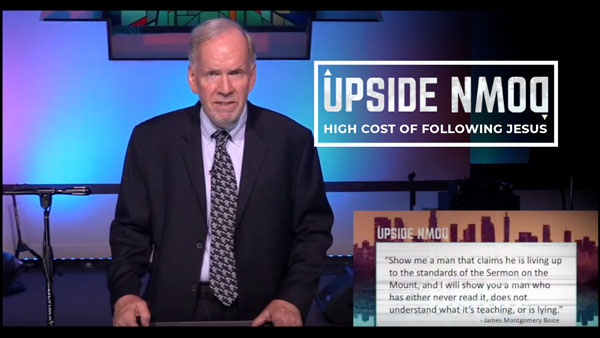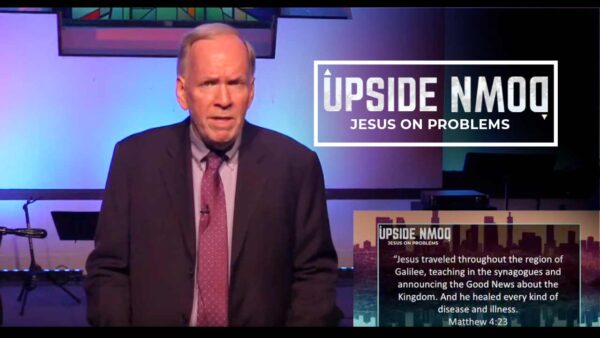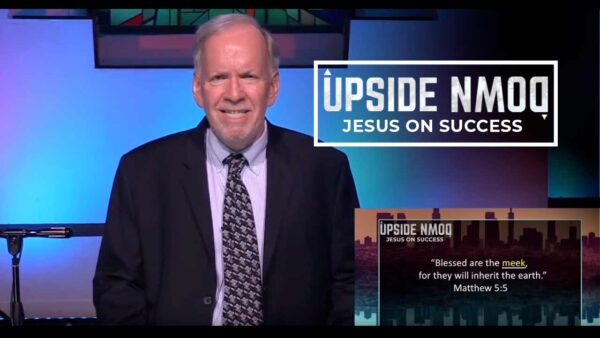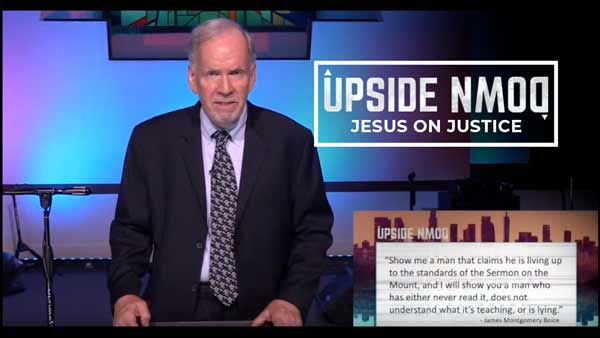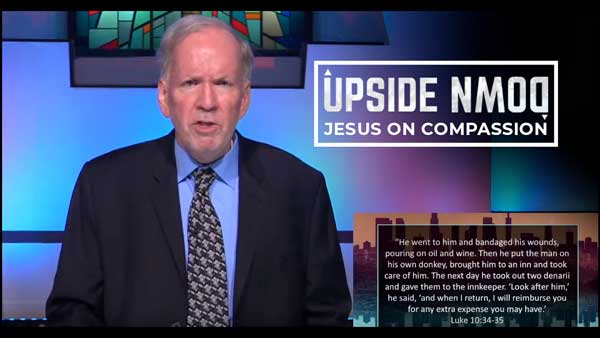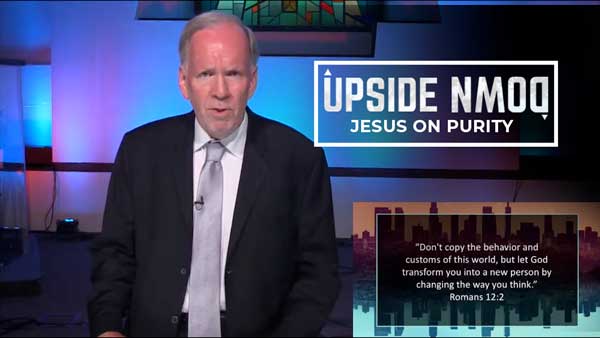Dr. Rick Mandl - July 19, 2020
Blessed Are The Merciful
Sermon Manuscript: Upside Down Message 5- Blessed Are The Merciful
Sermon preached by Dr. Rick Mandl, Eagle Rock Baptist Church, July 18 & 19, 2020Recorded in Los Angeles, CA.
Hey church family, how are you doing? And I what I mean by that is “How are you doing?” How are you doing in terms of adjusting to this newest installment, of what we are reluctantly having to accept as “The New New Normal.” A week ago, many of us were grumbling about the way things were in the age of COVID19. But some of us tried to find comfort in the thought that as bad as things were, they could be worse. And today, we don’t find a lot of comfort in being able to say, “I told you so! - See they are worse!” As someone once said, "It’s like you’ve been traveling through this long dark tunnel, and all you want is to get out. And finally, you start to see a light at the end of the tunnel. And you move toward it, only realize that that light is in fact, an oncoming train." This is a great time to remind ourselves of the fact that when things are out of our control, they are not out of God’s control. He is still in control. He is still at work. And although he doesn’t phone ahead to tell us how he is going to work these things for our good, and His glory, we still believe he will. And we rest in that confidence. As continue to adjust to all the things that are changing, we realize that some things don’t change.
God’s Word tells us that as his people, we are to “Rejoice with those who rejoice and weep with those who weep.” We do those two things, whether we’re able to gather together physically, or whether we’re having to come together from a distance. This past Thursday, the oldest member of our ERBC family, a man by the name of Richard Morgan, Went to be with the Lord. Richard was 102 years old. And if you’ve been a part of our church family for any length of time, you knew Richard. Richard made his living as a master chef. As a much younger man, he was a chef on the railroad, cooking on dining cars as they travelled the country. In more recent years, he was a Chef at the Brown Derby on Wilshire, and then in more recent years, just up the road at the Anandale Country Club in Pasadena. Richard was always committed to using the gifts that God gave him for his glory. And so for many many years he did all the cooking here at our church. Whether that was for church dinners, or for Men’s Breakfasts, our for our monthly food serving ministry to Skid Row that we called Street Kitchen.
When you live to be 102, you gain a lot of wisdom, and I remember once asking Richard, what he had learned through those 102 years, and he told me that he had learned that in life, only two things mattered. I was surprised by that – and asked him to clarify. I said “Really? - Just two things? - - Well, what are they? And he told me, "The only two things that matter in life are GOD and PEOPLE." He said, “If you make friends with both, you’ll do just fine.” Richard didn’t just share that wisdom, he lived by it. As we celebrate Richard’s graduation into glory, we extend our love and condolences to his family and friends, and we rest in the assurance that we if we took Richard’s words to heart... If we made friends with God and People... Well, we know that we’ll see Richard again. If you knew Richard, you know that he loved to hear God’s Word preached, and so to honor that, I want to move on to that right now.
We’ve been in a series looking at the beginning of the Sermon on the Mount and that part of the Sermon that’s known as the Beatitudes. These are the statements that all begin with the words “Blessed are..." In each statement our Lord was saying, “If you want to be blessed by God, here’s the life that you’ll be living.” Today’s verse... Matthew 5:7 “Blessed are the merciful, for they will be shown mercy” (Matthew 5:7). That’s what we’re going to be looking at today. And I want to begin with the question... What Does It Mean To Be Merciful? Maybe the best way to understand what Mercy is, is to look at what it’s not. There are TWO PASSAGES IN MATTHEW'S GOSPEL where MERCY IS CONTRASTED AGAINST ITS OPPOSITE. If you’ve got your Bibles, open up to Matthew 9:10-13. If you don’t have your Bible the verses are on your notes and they’ll also be up on the screen.
The first thing we’ll see in this passage is that... Mercy is Not MECHANICAL. What to I mean by that? Well take a look at Matthew 9, verse 10 – there we read, “While Jesus was having dinner at Matthew’s house, many tax collectors and SINNERS came and ate with him and his disciples. When the Pharisees saw this, they asked his disciples, “Why does your teacher eat with tax collectors and sinners?” On hearing this, Jesus said, “It is not the healthy who need a doctor, but the sick. But go and learn what this means: ‘I desire mercy, not sacrifice.’ For I have not come to call the righteous, but sinners.” Let’s stop right there. In that story the OPPOSITE of MERCY IS SACRIFICE. And the words of Verse 13 - "I desire mercy, not sacrifice" are actually a quote from an Old Testament passage. And since Jesus told his hearers to “go and learn what it means” That might be good advice for you and me as well. If you look up the passage that he’s referring to, you’ll see that it comes from Hosea 6:6. And there God tells his people that.... Their love for him is like the dew on the grass. It's there for a little while in the morning and then it's gone -- As soon as the sun comes out - - - it's burned away - - - and the only thing that's left as evidence that it ever existed are the ashes from their burnt offerings. That's not the kind of MECHANICAL DEVOTION that God wants from his children.
In the passage we’re looking at, in Matthew 9 - Jesus was doing something THAT HE OFTEN DID that infuriated the straight-laced religious leaders of his day. He was eating with those people that He knew mattered to God - but that the religious leaders thought didn’t. He was eating with TAX COLLECTORS AND SINNERS. And the REASON HE DID THIS was because HE SAW THESE PEOPLE as those who were sick and in need of a physician -- THEY WERE SICK -- HE HAD MEDICINE. The Pharisees who criticized Jesus for who he was eating with couldn't see any further than their own ceremonies -- the fact that He was eating with sinners -- and therefore was becoming CEREMONIALLY CONTAMINATED -- They were enslaved to MECHANICAL RELIGIOUS RITUAL. RELIGION BY THE NUMBER.
But... MERCY IS NOT MECHANICAL. It’s also not. . . . It’s not MEASURED. You see that in Matthew 23:23-24 it’s there that Jesus says, “Woe to you, teachers of the law and Pharisees, you hypocrites! You give a tenth of your spices—mint, dill and cumin. But you have neglected the more important matters of the law—justice, mercy and faithfulness” (Matthew 23:23). “You should have practiced the latter, without neglecting the former. You blind guides! You strain out a gnat but swallow a camel” (Matthew 23:24). "Straining out a gnat, swallowing a camel" That’s talking about RELIGION BY THE MILLIMETER -- Today it would be the person who reads what the Bible says about tithing and then gets stressed out because they can't figure out whether they are supposed to tithe on their net or their gross income -- Or if they receive cash as a birthday gift do they owe God 10% from that? Our Lord warned these religious leaders that a preoccupation with measuring our devotion to God can cause us to MISS OUT on what he calls the MOST IMPORTANT MATTERS -- and listed among them is MERCY.
If mercy is NOT MECHANICAL and it's NOT MEASURED. Then what is it? A simple definition would consist of three words - “Mercy is...... LOVE IN ACTION. And it's probably seen nowhere more clearly than in the Parable of the GOOD SAMARITAN -- a story our Lord told to a lawyer who came to him asking two questions. The first question is recorded in Luke 10:25, “An expert in the law stood up to test Jesus. ‘Teacher,’ he asked, ‘WHAT MUST I DO to inherit eternal life?" The question was MECHANICAL. He came to Jesus looking for SOMETHING THAT HE COULD DO -- SOME ACTION -- SOME RELIGIOUS DEED -- so that WHEN IT CAME TO THE DAY OF JUDGEMENT he could RECEIVE ETERNAL LIFE. Something else you see in this encounter is that JESUS DEALT WITH THIS QUESTIONER ON THE BASIS THAT HE CAME TO HIM. This man CAME ASKING FOR SOMETHING MECHANICAL -- SOMETHING THAT HE COULD DO - to earn God's favor -- and THAT WAS THE BASIS UPON WHICH JESUS ANSWERED HIM. He answered the man’s question with a question... ‘What is written in the Law?’ he replied. ‘How do you read it?’ (Luke 10:26). This man answered, ‘Love the Lord your God with all your heart and with all your soul and with all your strength and with all your mind’; and, ‘Love your neighbor as yourself.’ ‘You have answered correctly,’ Jesus replied. If you want something to do - then... ‘Do this and you will live.’
The next question that this inquirer asks isn't about MECHANICS but about MEASURING... “But he wanted to justify himself, so he asked Jesus, “And who is my neighbor?” You think about it, and you realize - - It's AN IMPORTANT QUESTION because IF loving his neighbor was PART OF WHAT IT WOULD TAKE to gain God's mercy, THEN this man wanted to be ABSOLUTELY SURE that it was CLEARLY DEFINED IN ADVANCE as to who that neighbor was, SO THAT he could be sure that he DIDN'T WASTE ANY LOVE on someone that he didn't have to. And it was in response to the first question that was MECHANICAL and the second one that was MEASURING that Jesus spoke a parable that demonstrates the MARKS OF MERCY. We know it as... The Parable of the Good Samaritan (Luke 10:30-37).
The story goes like this beginning with Luke 10:30... “In reply Jesus said: ‘A man was going down from Jerusalem to Jericho, when he was attacked by robbers. They stripped him of his clothes, beat him and went away, leaving him half dead.’ A priest happened to be going down the same road, and when he saw the man, he passed by on the other side. So too, a Levite, when he came to the place and saw him, passed by on the other side. But a Samaritan, as he traveled, came where the man was; and when he saw him, he took pity on him. He went to him and bandaged his wounds, pouring on oil and wine. Then he put the man on his own donkey, brought him to an inn and took care of him. The next day he took out two denarii and gave them to the innkeeper. ‘Look after him,’ he said, ‘and when I return, I will reimburse you for any extra expense you may have.’ Which of these three do you think was a neighbor to the man who fell into the hands of robbers?’ The expert in the law replied, ‘The one who had mercy on him.’ Jesus told him, ‘Go and do likewise’” (Luke 10:36-37).
This story illustrates, not only mercy, but also its opposite. YOU SEE MERCY in the actions of the Samaritan. YOU SEE THE OPPOSITE OF MERCY in the response of the Priest and the Levite. It's interesting that as Jesus tells this story which so powerfully portrays what mercy is not, he chooses a Priest and a Levite... A PASTOR and a MINISTER OF WORSHIP to illustrate what Mercy isn't. I don't think it was by accident – I think it's a WARNING to any of us who spend a lot of time in serving the Lord, to beware of getting so caught up in the MECHANICS of doing things for God -- religious activity - - - that we become blind to the needs of others around us. Sometimes the good can be the enemy of the best. We can get so caught up in preaching, or praying, or teaching, or tithing, that we fail to cultivate hearts of compassion for the hurts of others. What does mercy look like?
From this story that Jesus told we see three things... “If I’m Merciful, I’ll SEE those who are SUFFERING. Even though it says that all three - the Priest, the Levite, and the Samaritan saw the injured traveller - it was obviously a different kind of vision that the third of these had when he saw the hurt. I think that this message is important for us because... There is so much hurt in our world that it's easy to become blind to the needs around us. We drive the freeways and every day at the off-ramps you see homeless standing with signs that say "WILL WORK FOR FOOD". And you drive those freeways often enough, those people disappear -- we don't even see them. Some are scamming - others are in legitimate need - both situations are sad. Sadder still is when they become invisible to us.
If I'm Merciful... One, I'll SEE those who are suffering. And then secondly, I’ll FEEL COMPASSION for those who have FALLEN. All three of the travelers on that Jericho road may have seen the wounded traveler but ONLY ONE OF THEM FELT COMPASSION -- the first two passed by on the other side of the road BUT.... And this is a BIG BUT... a Samaritan, as he traveled, came where the man was; and when he saw him, he took pity on him. Notice... Mercy starts with AWARENESS - You see the need. It next issues forth in an ATTITUDE - You feel compassion... But it also involves taking ACTION.
If I'm merciful.... I’ll SEE THOSE WHO ARE SUFFERING. I’ll FEEL COMPASSION FOR THOSE WHO HAVE FALLEN. And then third, I’ll HELP those who are HURTING. Mercy is more than AWARENESS, It's more than ATTITUDE, It's also an ACTION -- it's DOING SOMETHING FOR THE PERSON IN NEED TO RELIEVE THEIR DISTRESS. That's what the Samaritan did... “He went to him and bandaged his wounds, pouring on oil and wine. Then he put the man on his own donkey, brought him to an inn and took care of him. The next day he took out (Some Money) and gave them to the innkeeper. ‘Look after him,’ he said, ‘and when I return, I will reimburse you for any extra expense you may have.’ When you FEEL SORRY FOR SOMEONE that's not being like Christ -- when you DO SOMETHING ABOUT IT -- that's being like Christ. 1 JOHN 3:17-18 says, "If someone who is supposed to be a Christian has enough money to live well, and sees a brother in need but won't help him - how can God's love be in him? ... Let's stop just saying we love people...let's show it by our actions!"
Someone once asked the late comedian Flip Wilson - "What's your religion?" He said "I'm a Jehovah's Bystander" - I don't want to get involved. Mercy gets involved - it helps those who are hurting. If I'm Merciful... 1) I'LL SEE THOSE WHO ARE SUFFERING. 2) I'LL FEEL COMPASSION FOR THOSE WHO HAVE FALLEN. 3) I'll HELP those who are hurting. And let me add something to that. I’ll help those who are hurting... even if they are my enemy. You see that in verse 33. This story that our Lord told was made even more powerful by the cast of characters that he selected. The two who passed by - - - The ones who didn’t stop to offer assistance - - they were Jewish leaders. The one who did help was a natural enemy of the one in distress – He was a half-breed Jew with a warped religious tradition - - and yet he was the one who stopped to help the Jew who hated him. If I’m merciful, it means I’ll help those who are hurting even if they’re my enemy. And there was powerful example of this that took place near Philadelphia this past Father’s Day. And just in case you missed the story, I want to share it with you now...(VIDEO about Daylan McLee)
There are a few things that I can imagine that would be worse than spending a year in jail. One of those would be spending a year in jail, if I knew I was innocent. That year that Daylan McLee spent in jail was a year away from his children. It was a year away from his mother, who was ill at the time and passed away last year. Nevertheless, McLee said it wasn’t a complicated decision to help another human being. He said. “There is value in every human life. We are all children of God and I can’t imagine just watching anyone burn,” He said, “No matter what other people have done to me, or other officers, I thought, ‘This guy deserves to make it home safely to his family.’” And thanks to Daylan McLee he did.
In Luke 6:33-36 Jesus said, "If you do good to those who do good to you, what credit is that to you? Even `sinners' do that!....But love your enemies, do good to them...then your reward will be great...Be merciful, just as your Father is!" If you want to be like God - the way to do it is to be merciful - to do good to those who do evil to you. That's the exact opposite of what society says. Society says when people hurt you - you hurt them back. You don't get mad - get even. God says – “You not only forgive that person - you look for ways to be nice to that guy.” Why? Because the best way to eliminate an enemy is to turn him into a friend.
Mercy is love in action -- it's THE WAY THAT GOD TREATS PEOPLE because He is slow to anger, merciful, compassionate, and rich in love. Now maybe to you, this SOUNDS GOOD, but you’re not sure how to get there from here. You look at your life, and if you’re honest, you’d have to admit that mercy is not a dominant characteristic. How can I become merciful? The first thing you need to do is... RECOGNIZE your need for mercy. James 2:13 says, “Judgment without mercy will be shown to anyone who has not been merciful. Mercy triumphs over judgment.” I need to RECOGNIZE MY NEED FOR MERCY. NOT JUST at the moment I come to Christ for salvation but DAILY. When you think about the people in your life who really give you a hard time - those people who make your blood boil -- if you're having a hard time being merciful to those people - stop for a moment and think about what a hard time you have given God. Think about all the flack you've given him - think about all the stuff you've done your own way -- all the times you have said "God I know that this is what you want me to do but sorry I'm going to do it my way" And yet in spite of all of that God still loves you. Why? Because he's MERCIFUL and YOU NEEDED THAT MERCY. You want to be a person who is merciful? You RECOGNIZE YOUR NEED FOR MERCY and then... RECEIVE the mercy God offers. Why?? Because you can't give away what you don’t have. Titus 3:4-5 says, “But when the kindness and love of God our Savior appeared, he saved us, not because of righteous things we had done, but because of his mercy.” Mercy is not a natural quality -- it's a gift from God. And the receiving of that mercy isn't just A COMMERCIAL TRANSACTION - - - -it's something you have to experience in your heart.
There is a Parable in Matthew 18. It’s a Parable about A MERCIFUL KING and AN UNMERCIFUL SERVANT. And that servant owed his king an enormous debt, and he pleaded with the king to give him time to work to repay that debt, even though there was no way on earth that he could live long enough to work it off. Do you know what the king did? The king offered him MERCY – He didn’t just offer him time to work off the debt... He cancelled the debt. But sadly, that servant RECEIVED THAT MERCY IN A COMMERCIAL WAY – It never penetrated his heart and as a result he didn't have it to pass on to one of his fellow workers who owed him a small debt. I need to RECOGNIZE MY NEED FOR MERCY. I need to RECEIVE THE MERCY THAT GOD OFFERS.
And then I need to... RISK being merciful to others. There are some of you watching today who have people in your life that you feel you CAN'T FORGIVE. You're saying "You don't know how much this person hurt me! They have hurt me and they continue to hurt me. And I just can't forgive them." What I would say to you is... If that's true - that You can’t forgive them. Then "I hope you never sin" -- because forgiveness and mercy is a two-way street. When you REFUSE TO FORGIVE OTHERS and you REFUSE TO SHOW MERCY to others - - what you’re doing is you're burning the very bridge you have to walk across to get to heaven. The Bible says THOSE WHO SHOW MERCY RECEIVE MERCY - those who don't, do not. You need to show mercy because you'll need mercy. Is there a cost to being merciful? Absolutely. That’s why I say you need to take the risk... to pay the price... The Bible pointing to Jesus as our example says, “For we do not have a high priest who is unable to sympathize with our weaknesses, but we have one who has been tempted in every way, just as we are—yet was without sin” (Hebrews 4:15). When God wanted to show mercy to us he didn't just say “I want to sympathize with you.” He said “I'll put skin on.” WAS THERE A COST INVOLVED? Absolutely - our Lord had to lay aside the glory of heaven and take on the limitations of a human body. He had to follow a path that culminated in a painful death on a Roman cross. But he PAID THAT PRICE- he TOOK THAT RISK in order to extend mercy to us.
MERCY ALWAYS INVOLVES A COST – There was a COST FOR THAT SAMARITAN on the Jericho Road as he INTERRUPTED HIS SCHEDULE… TOOK THE TIME TO BANDAGE THE WOUNDS of the injured traveler… And then TOOK A DETOUR in order to get him to an inn where he could pay the price for his lodging and continued care. MERCY IS ALWAYS COSTLY – WE TAKE A RISK WHEN WE EXTEND it because WE GIVE UP SOMETHING and we're NOT SURE IF WE'RE GOING TO GET ANYTHING BACK IN RETURN. One man was reflecting on his marriage and he said… "Every time I get in any kind of argument with my wife she gets so HISTORICAL -- NOT HYSTERICAL BUT HISTORICAL." We like to HOLD ON TO HURTS because it gives us A SENSE OF POWER over the person who has hurt us. WHEN WE FORGIVE -- WHEN WE SHOW MERCY we are RELEASING THAT POWER. WHEN SOMEBODY HAS WRONGED ME AND I GRANT FORGIVENESS there is a DRAMATIC POWER EXCHANGE. The WIFE WHO IS HISTORICAL is holding on to power. WHEN YOU REALLY FORGIVE you give up that power. THERE IS A RISK INVOLVED - but when you think about it -- it's A RISK YOU CAN'T AFFORD NOT TO TAKE.
Matthew 25 says that the thing that Christians are going to be judged for at the judgment is how they treated other people... “For I was hungry and you gave me something to eat, I was thirsty and you gave me something to drink, I was a stranger and you invited me in, I needed clothes and you clothed me, I was sick and you looked after me, I was in prison and you came to visit me'" (Matthew 25:35). And we're going to say... 'Lord, when did we do all of that to you? And he will say - "In as much as you have done it to anybody else - you have done it to me?" Matthew 5:7 says, “Blessed are the merciful, for they will be shown mercy."
In the age to come - when we meet God face to face - the people who will receive mercy from him are the people who have been merciful. It's NOT THAT WE EARN HIS MERCY BY OUR MERCY -- if that were the case it would be A CONTRADICTION IN TERMS – it wouldn’t be mercy. What God will look at on that day is not A PUNCHED TIME CARD that says you've worked so hard at being merciful and therefore deserve so much of a reward. Instead what he will look at is YOUR MEDICAL CHART. The record of how you trusted him as your GREAT PHYSICIAN, and how the MEDICINE OF HIS WORD, and the MINISTRY OF HIS SPIRIT took effect in your life and HEALED YOUR UNMERCIFUL DISPOSITION. When he sees that HE WILL COMPLETE THAT WORK OF HEALING and WELCOME YOU INTO HIS KINGDOM FOREVER. Let's thank him for that as we bow together... Let's pray.
Recorded in Los Angeles, CA.
Scripture References: Matthew 5:7, Matthew 9:10-13, Matthew 23:23-24, Luke 10:25-28, Luke 10:30-37, James 2:13, Titus 3:4-5, Hebrews 4:15, Matthew 5:7
